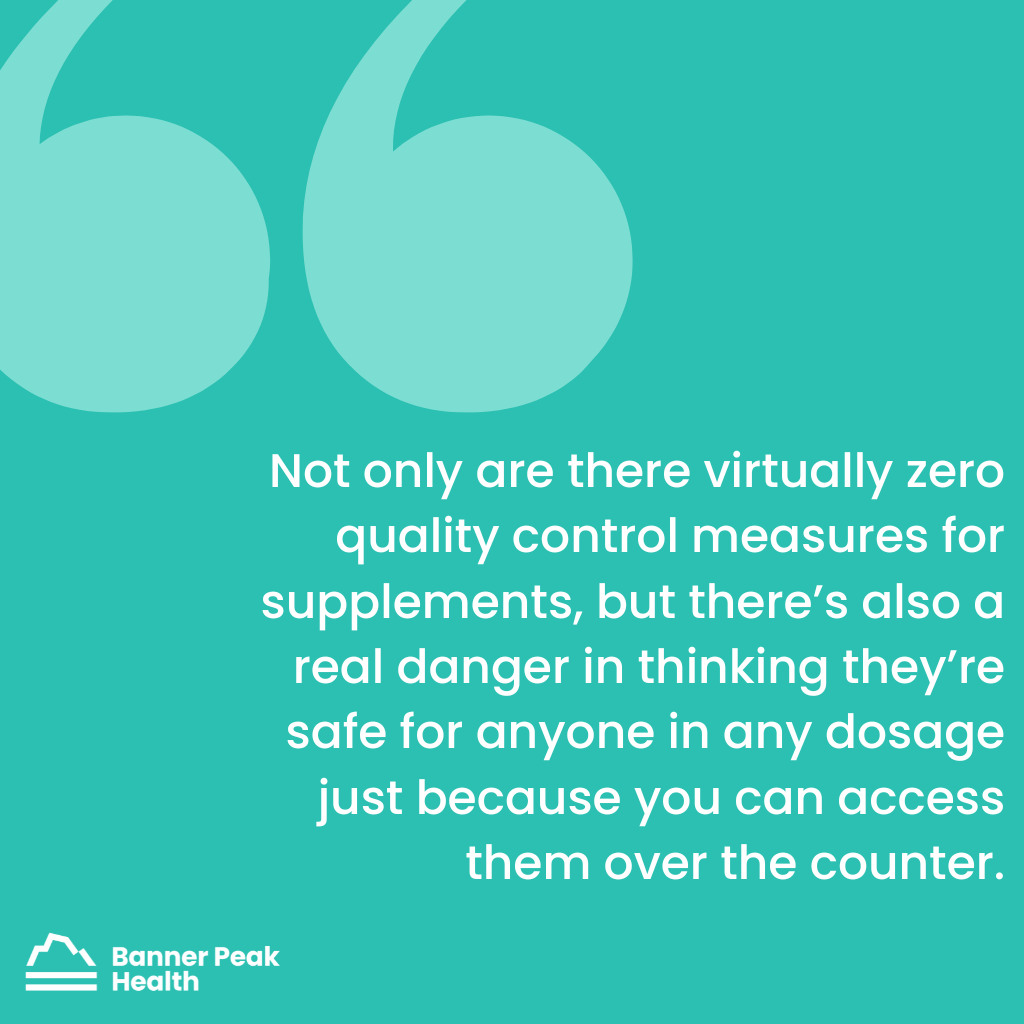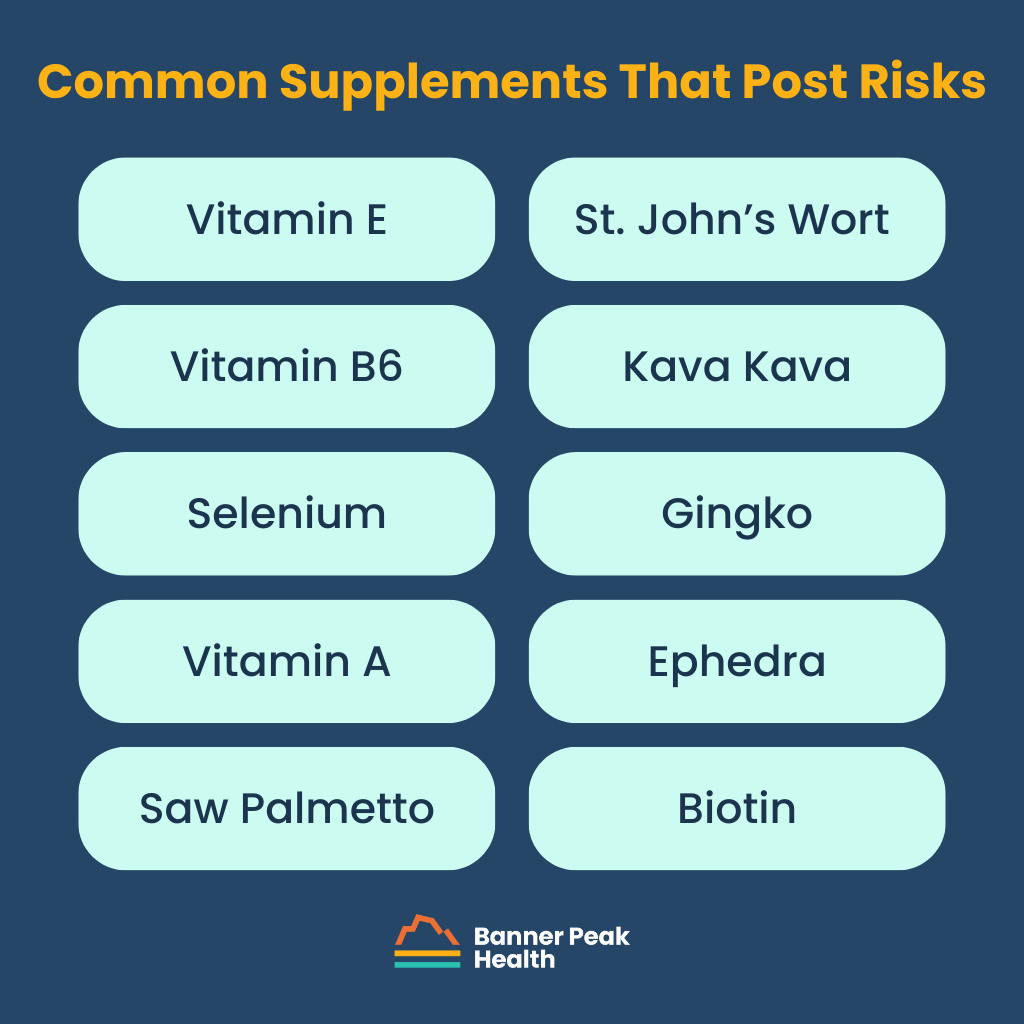For this topic, I’d like to share a few stories about patients I’ve had over the years.
A patient of mine, a young woman in her 30s, was suffering from chronic fatigue and joint pain. This was during COVID, but all her workups were negative. I struggled to determine whether she had a chronic illness.
She began seeing a naturopath, who prescribed a series of supplements — at least 10 to be taken in tandem. A month after she began taking these, she called the naturopath’s office to tell them she felt worse. The naturopath reassured her she was detoxing, and she’d feel worse before feeling better.
Skeptical, she called me, and I asked her to come into the office. She was jaundiced, so I did some lab tests. The results showed she was in liver failure.
She ended up hospitalized and on a liver transplant list. She was young and otherwise healthy, so three or four months after stopping the supplements, her liver fully recovered, and she didn’t need a transplant.
Although it’s difficult to determine which supplement played the biggest role in her liver failure, there’s no doubt the supplements caused her condition. She was extremely lucky to make the recovery she did.
Another patient of mine was taking an off-brand fish oil supplement and suffered from hair loss. We investigated and found she had mercury toxicity. Her mercury levels decreased once she stopped taking the fish oil, and her hair grew back.
Finally, I saw a patient who always presented with high liver enzymes at her routine physicals. Although we did many workups, we struggled to determine the reason.
Eventually, I asked if she took any vitamins. She brought me a huge bag of supplements that contained toxic doses of vitamin A. Mystery solved.
I share these stories to demonstrate a point I often make to my patients: vitamin supplements can provide our bodies with necessary elements they would otherwise lack, but taken without caution and care, these same supplements can do more harm than good.
Not All Supplements Are Safe
In 1994, the Food and Drug Administration (FDA) passed the Dietary Supplement Health and Education Act (DSHEA). It established that “dietary manufacturers” don’t need to adhere to the same regulations as pharmaceutical companies.
This means as long as a product is categorized as a “dietary supplement,” manufacturers don’t need to prove positive results before marketing and selling the product. Instead, the FDA must prove the product is unsafe before issuing a recall, a process which can take years, leaving potentially dangerous products on store shelves in the meantime.
Many products go to market containing poor-quality ingredients, hiding ingredients that aren’t listed on labels, or lacking the ingredients they claim to contain. As such, labels frequently list minimal information regarding ingredients and the amount of each.
For example, several years ago, I saw a patient with high blood pressure and diabetes. She was overweight and had tried many different weight loss plans. One day, she told me she’d lost 12 pounds in three months.
I congratulated her and asked how she did it. She showed me the supplement she’d been taking.
The ingredients confused me, because they were all benign things like cranberries and fruit pectin. When I investigated further, I discovered that the supplement contained Fen-Phen, which was especially dangerous for this patient, who already had high blood pressure.
Not only are there virtually zero quality control measures for supplements, but there’s also a real danger in thinking they’re safe for anyone in any dosage just because you can access them over the counter.
That’s simply not true.
More Is Better, Right?
Wrong.
Companies often take advantage of loose federal regulations. Pair that with the ability to buy online, and we’re left with a huge industry harboring immense potential for disaster.
In America, we tend to believe more is better. If one is good, three will work faster or better. However, that isn’t consistent with what we know about your body’s homeostasis.
The truth is, a little of something might help, but too much might throw other things off.
Throughout the past few years, Americans have been desperate for information and looked to supplements to boost their immune systems during lockdown. At the same time, there’s been mistrust of the medical establishment and the propagation of pseudoscience to desperate people.
We all want to be in control of our health, but we take these supplements without realizing the potential hazards. Often, we don’t even disclose what we’re taking to our doctors. But we should.
Risks Associated With Common Supplements
Below is a list of the most common supplements that carry the highest risks (and what those risks are) when taken in excess or when manufactured poorly. Talk to your doctor before starting or altering any medications or supplements.
Poor Quality Risks — Contamination
- Harmful substances
- Mold — consequence of improper storage or expired ingredients.
- Medication
- Male enhancement supplements (Viagra, Cialis, etc.) — some amounts may contaminate generic or natural supplements produced for male enhancement, which is dangerous for men taking nitrates for their heart.
- Heavy metals
- Mercury — sometimes present in low-quality fish oil.
- Lead and arsenic — Ayurvedic medicine may contain these.
- Allergens
- Shellfish — collagen supplements often contain crustaceans.
Excessive or Unnecessary Dosing
- Vitamin E — can be in a standalone vitamin or multivitamin; taken for heart health; more than 400 IU daily may increase all core causes of mortality, and over 800 IU daily may increase the risk of heart failure.
- Vitamin B6 — excessive doses can increase neuropathy.
- Selenium — taken for prostate health; can increase hemoglobin A1C, risk of melanoma, and all core causes of mortality.
- Vitamin A — can cause birth defects when taken during pregnancy; increases risk for osteoporosis and hip fractures.
- Saw Palmetto — taken to remedy hair loss; can cause birth defects when taken by pregnant women.
- St. John’s Wort — interacts with antidepressants and can cause serotonin syndrome; decreases the effectiveness of birth control.
- Kava Kava — can lead to liver failure.
- Gingko — taken for improved cognition; can increase risk of brain hemorrhage, seizure, and stroke.
- Ephedra — banned in 2004 in the U.S. after dozens of people died as a result of taking it; causes heart attack, stroke, and sudden death.
- Biotin — taken for hair, skin, and nails; can interfere with the following tests:
- Blood tests for heart injury and heart failure — can throw off the results
- Thyroid testing — can throw off the results
- Urine pregnancy tests — can affect the control line
Today’s Takeaways
- Supplements aren’t inherently bad, but you must be careful about what and how much you take.
- Let food be thy medicine. Don’t take supplements to make up for a terrible diet.
- Talk to your doctor. They can tell you what supplements you really need, check for drug interactions, and educate you on side effects and warning signs. Keep your doctor in the loop and avoid becoming our next horror story.

Waheeda Hiller, MD
For over 20 years in Internal Medicine, Dr. Hiller has dedicated herself to providing unparalleled care to patients. She joined Banner Peak Health in 2023 as a concierge physician to better serve patients with the depth of thought, knowledge, and compassionate care they need to live the healthiest lives possible.





